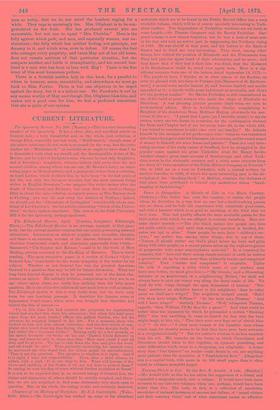Down in Dingyshire. A Sketch of Life in the Black
Country_ (Seeloys.)—The writer has seen the country, or rather the people whom he describes in a way that no one but a hard-working parson can 803 them, and he tells his experience with admirable good-sense, and with a humour which is as good as anything of the kind that we have seen. This last quality affords the more available points for the brief notice with which we are obliged to content ourselves. Here are some choice morsels :—" The rite which makes two people one, does not settle which one:; and until that weighty question is decided, dis- putes are apt to arise." Some people, he says, have "children's ser- vices;" our author has, among other things, this to say of these. "Nature (I should rather say God's plan) mixes up boys and girls along with older people, as a recent patent mixes up the explosive grains of gunpowder with some non-explosive material." In a cemetery he remarks, that "here and there among simple mounds of earth he notices a gravestone set up by some more than ordinarily tender and competent relative." That "tender and competent" is exquisite. Under the risk of repeating a story which some of our readers may have seen before, we mast give this :—"My friends,' said a Dissenting minister at an anniversary in a neighbouring Bethel, 'we shall not always have to plod our weary way along the dusty roads of life. We shall fly with wings through the open firmament of heaven.' 'Wil- liam,' muttered an attentive hearer to his neighbour, does he Tales- mean we shall have wings?' The neighbour nudged assent. 'Heh wilt thou have wings, William?' ' So the mon says, Thomas.' 'And will I have wings?' ' Sartinly, Thomas." Well,' whispered Thomas, eagerly, • then, William, I'll fly thee for a quart." And what could be better than the argument by which he persuaded a certain "Shaking Billy," who was unwilling to come to church for fear that the boys might laugh at him, viz., " That there were more boys out of church than in it"? Or this I often meet women of the humbler class whose whole hope for eternity seems to be that they have once been servants in a clergyman's family "? But our author's wisdom is no less manifest than his wit. His remarks on the terms on which Churchmen and Dissenters should learn to live together, on open-air preaching, and other difficulties which occur to a clergyman, are admirable. A better story than "Our Quarrel" no reader could desire to see, nor anything more pathetic than thE narrative of "Tumbledown Row." Altogether this is a capital book, with more in its 160 small pages than is often found in volumes manyfold larger.


































 Previous page
Previous page